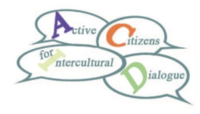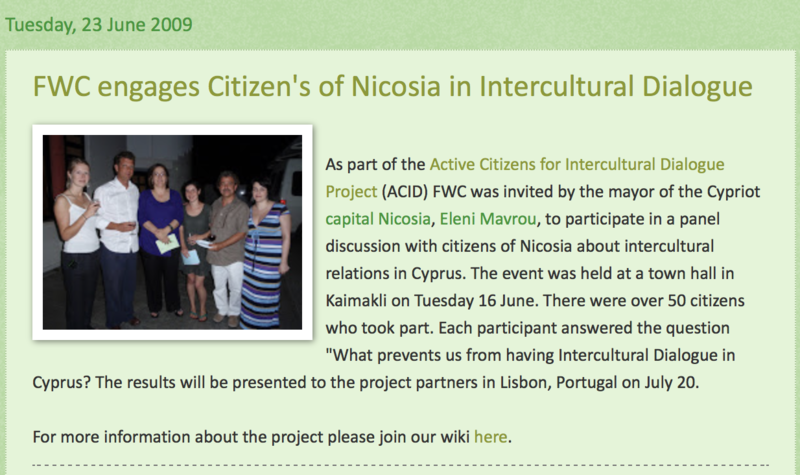Active citizens for intercultural dialogue
|
The project ACID intends to promote the concept of intercultural learning. “Intercultural learning” can be one tool in our efforts to understand the complexity of today’s world, by understanding others and ourselves a bit better. Moreover, it can be one of the keys to open the doors into a new society. “Intercultural learning” may enable us to better face the challenges of current realities. We can understand it as empowerment not just to cope personally with current developments, but to deal with the potential of change, which can have a positive and constructive impact in our societies. Our “intercultural learning capacities” are needed now more than ever. In this context, intercultural learning is a personal growing process with collective implications.
Specific Objectives
The specific objectives of the project proposal are to support citizens' panels in all participating countries which enable the active interaction and discussion among citizens on the importance of intercultural dialogue at European level; To collect the opinion of citizens on a key European challenge for the future such as the intercultural dialogue in a multicultural Europe; To create mechanisms that enable European citizens to develop civic competences, to formulate their views and opinions on the European integration process in the form of recommendations for policy makers at European level; To encourage the dialogue between European citizens and the institutions of the EU, empowering citizens as regards EU policies and their impact, and ensuring appropriate follow up of citizens' opinions by the EU institutions.
Expected Results
The project ACID, though its methodology, will impact the way of communication and expressing values of European citizens participating in the panels. The empowerment of citizens’ self-confidence in having intercultural communication and applying intercultural attitudes, will contribute to the development of skills that can be applied to active citizenship. Active citizens are more attentive and conscious about impacts of regional, national and European polices, and thus can influence their improvements. In terms of long-term effects, we foresee that the project can support local partnerships among Local authorities, schools, youth associations, non-profit organisations and NGOs for the implementation of local strategies and ad hoc projects addressed to the local community, in order to improve their active participation in the definition of local policies to promote intercultural dialogue in their community.
European Citizens Panel
Pisa, ITALY
16 – 17 September 2009
Triggering Question
What actions if implemented will improve intercultural dialogue?
Action 18: Avoid electing politicians who refuse to engage in discussion with certain groups Clarification: Each politician should criticize their vote, no voting to extremist parties.
Αction 37: Hiring educators from different cultural backgrounds and delivering of certain class curricula as a group of educators. Clarification: Professors – Teaching. Organize cooperation between groups of students who come from different countries, ethnologically heterogeneous.
Action 55: Use cinematography to fight against racism Clarification: Cinema. For example, war movies where good and bad, brave and coward exist on both sides. It might seem irrelevant but it is the root of evil that leads to the rest…….
Action 12: Teach in schools the lesson of intercultural dialogue Clarification: A lesson that informs the students about the different groups that compose each community.
Action 30: Organization from local authorities of events that involve groups from different cultures. Clarification: It’s a way for people from different cultures to approach each other and a way for them to find common points.
Action 49: Collection of information about EU Institutions in each country and dissemination through a common distributor. Clarification: A big problem for intercultural dialogue between citizens and institutions is the ignorance of their own existence. For example, in Greece there are about 30 European players who are unknown to the general public of citizens. We need a body to provide information to citizens about all these European players.
Action 64: The promotion on television not only of idols of the “Arian race” Clarification: Changing the standards shown on television will help the acceptance of different groups
Action 70: Finding ways of communication from EU institutions to the citizens Clarification: The European bodies should inform the citizens for their existence and potentials.

